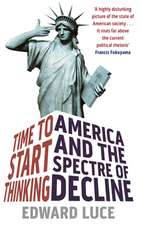Private Property and Public Power: Eminent Domain in Philadelphia
Autor Debbie Becheren Limba Engleză Paperback – 2 oct 2014
| Toate formatele și edițiile | Preț | Express |
|---|---|---|
| Paperback (1) | 245.35 lei 31-37 zile | |
| Oxford University Press – 2 oct 2014 | 245.35 lei 31-37 zile | |
| Hardback (1) | 775.78 lei 31-37 zile | |
| Oxford University Press – 18 sep 2014 | 775.78 lei 31-37 zile |
Preț: 245.35 lei
Preț vechi: 303.16 lei
-19% Nou
Puncte Express: 368
Preț estimativ în valută:
46.95€ • 49.14$ • 39.08£
46.95€ • 49.14$ • 39.08£
Carte tipărită la comandă
Livrare economică 19-25 martie
Preluare comenzi: 021 569.72.76
Specificații
ISBN-13: 9780199322558
ISBN-10: 0199322554
Pagini: 360
Ilustrații: 17 b/w line; 32 b/w halftone
Dimensiuni: 155 x 234 x 23 mm
Greutate: 0.52 kg
Editura: Oxford University Press
Colecția OUP USA
Locul publicării:New York, United States
ISBN-10: 0199322554
Pagini: 360
Ilustrații: 17 b/w line; 32 b/w halftone
Dimensiuni: 155 x 234 x 23 mm
Greutate: 0.52 kg
Editura: Oxford University Press
Colecția OUP USA
Locul publicării:New York, United States
Recenzii
Becher attempts to help the reader navigate the public-private dilemma raised by the use of eminent domain by highlighting the multiple ways in which public and private actions influence the value of private property... [Becher provides] practical insight on how to improve the implementation of eminent domain.
Property matters a great deal and getting it right is crucial. Debbie Becher nails it. Eschewing abstractions and the fulminations of libertarians and leftists alike, her excellent book captures how real people understand and evaluate government taking. The concept of investment that she develops offers important and challenging insights for policy makers and property theorists alike.
A powerful challenge to the conventional view of property in social science, Becher shows that people see property in a complex and social manner. This pioneering study demonstrates how- rather than treat property solely as a container for economic value or as a bundle of rights - people also invest their hopes, cares and emotions into it.
How to respond to the problems posed by derelict lots and vacant buildings is a question with which almost every city government grapples. Becher's analysis cuts through the familiar ideological slogans about government and private property to provide a deeper understanding of the political, economic and social forces driving urban redevelopment efforts. The result is a challenging and unexpectedly hopeful story with lessons that extend well beyond Philadelphia.
Property matters a great deal and getting it right is crucial. Debbie Becher nails it. Eschewing abstractions and the fulminations of libertarians and leftists alike, her excellent book captures how real people understand and evaluate government taking. The concept of investment that she develops offers important and challenging insights for policy makers and property theorists alike.
A powerful challenge to the conventional view of property in social science, Becher shows that people see property in a complex and social manner. This pioneering study demonstrates how- rather than treat property solely as a container for economic value or as a bundle of rights - people also invest their hopes, cares and emotions into it.
How to respond to the problems posed by derelict lots and vacant buildings is a question with which almost every city government grapples. Becher's analysis cuts through the familiar ideological slogans about government and private property to provide a deeper understanding of the political, economic and social forces driving urban redevelopment efforts. The result is a challenging and unexpectedly hopeful story with lessons that extend well beyond Philadelphia.
Notă biografică
Debbie Becher is Assistant Professor of Sociology at Barnard College, Columbia University.










